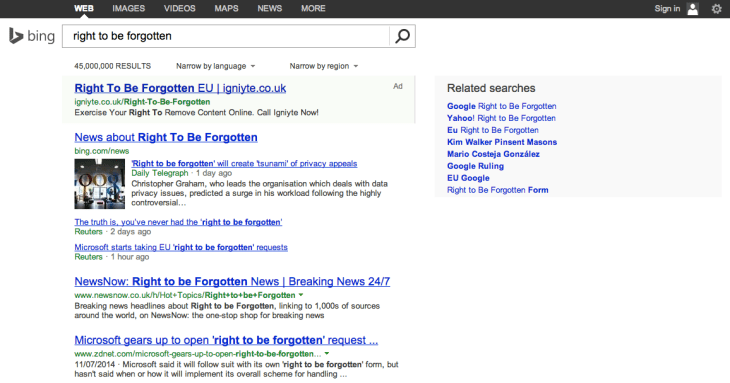Microsoft has followed Google’s lead and launched an online webform where European users of its Bing search engine (all few of them) can make a request for information displayed in search results triggered by a search for their name to be de-indexed — if that information is outdated or irrelevant.
The move follows the so-called ‘right to be forgotten’ ruling back in May by Europe’s top court, the ECJ, which found that search engines are data controllers and therefore should have to comply with existing European data protection legislation.
Google was faster off the mark to respond to the ruling — which was immediately enforceable — launching its rtbf removal form at the end of May. It’s since fielded more than 70,000 requests from private individuals wanting links about them to be de-indexed.
A week ago Redmond said it was working on its own implementation to comply with the ruling — and now has a formal process in place.
Microsoft’s webform is a little different to Google’s. For instance, it includes direct questions asking the rtbf requester whether they are a public figure, and also whether they more broadly have a role in the community that involves “leadership, trust or safety” — with given examples of this category including ‘teacher, clergy, community leader, police, doctor’.
That’s a key consideration because the ECJ ruling specifically relates to private individuals, not people with a public role in society.
Microsoft’s form also asks the requester to specify the nature of their objection to the information they wish to be de-indexed — asking them to identify whether it is “Inaccurate or false”, “Incomplete or inadequate”, “Out-of-date or no longer relevant” or “Excessive or otherwise inappropriate”.
“This information will help us to consider the balance between your individual privacy interest and the public interest in protecting free expression and the free availability of information, consistent with European law,” Microsoft notes on the webpage.
The company also makes clear that its form and processes may change — and that submissions may be “reevaluated” — based on any “additional guidance” about how the ECJ’s ruling should be implemented, noting that “many questions” have been raised about this.
“We continue to work out the details of the process we’ll use to evaluate the requests,” Microsoft added in a statement emailed to TechCrunch.
Google’s early implementation of rtbf requests drew attention and some criticism for being overly broad — leading to cries of censorship from media outlets and Google to restore some links it had initially de-indexed, for example.
The ECJ’s ruling has also been vociferously attacked by free speech advocates, and by others who view the law as unworkable.
The wider point is that requiring search engines to make judgements about whether information is in the public interest or not casts them in a role more typically reserved for publishers — or data protection arbiters.
That said, search engines could bounce rtbf requests to national data protection watchdogs if they wanted to wash their hands of the decision-making process.
Also worth noting: Google has a hugely dominant search market share in Europe — of circa 90% — so while Microsoft and other smaller search engines have a technical requirement to comply with the ECJ ruling, none of them command the same huge power to influence which information Europeans see for certain search terms as Google does.
